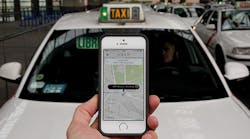As ride-sharing companies like Uber continue to edge out traditional taxi cab services, the company’s safety practices are being called into question.
Especially after a woman in her mid-20s in India accused her Uber driver of rape this past weekend.
The driver, who has now been apprehended, allegedly drove the woman to remote location after she fell asleep. He simply turned off the phone on which he had the Uber app installed, thus disabling the company’s GPS tracking of his vehicle, according to NDTV.
While Uber has issued a statement about the New Delhi incident, claiming that safety is its No. 1 priority, the incident in India certainly isn’t the first time the company’s policies in regards to safety have raised eyebrows.
One Uber executive recently suggested hiring opposition researchers to investigate journalists, while another used Uber’s “God View” function to track a journalist’s whereabouts without her permission.
And all of these issues arise as the company continues to grow. After securing another $1.2 billion in funding last week, Uber is now worth $40 billion and operates in 51 countries.
So, how safe is Uber?
Any growing company, and especially any company expanding as quickly as Uber, is likely to have some growing pains. But at what cost?
Because Uber hires independent contractors as drivers, it does not own the vehicles in which passengers are being transported. Vehicles thus do not have the built-in GPS trackers that traditional taxis do. So, as in the case in India, disposing of the device on which the Uber app is installed terminates the company’s tracking mechanism.
Further, Uber is not responsible for the vehicles’ drivers, who operate as third-party providers.
As much it outlined in Uber's terms and conditions:
“You acknowledge that Uber does not provide transportation or logistics services or function as a transportation carrier…Uber does not guarantee the suitability, safety or ability of third party providers. It is solely your responsibility to determine if a third party provider will meet your needs and expectations.”
Basically, Uber connects people in need of a ride with people willing to provide a ride, which on the surface can seem safer – or least more convenient -- than hiring a taxi.
But the taxi industry is an established one with safeguards in place. Taxi companies are responsible for their drivers and their passengers’ safety.
Uber maintains it is just an app, a networking service.
It is not held to the same standards of operation as traditional transportation companies, which gives it more flexibility in the marketplace and more ability to expand quickly.
That’s fine for growth, but what about safety?
